[ad_1]
Organic cat food has found its place in the homes of cat parents. As humans spend more and more on organic and natural foods for themselves, pet parents are following suit for their beloved companions. In fact, according to Future Market Insights, the organic pet food market is expected to grow at a CAGR (compound annual growth rate) of 7.4% and a valuation of $4 billion.
If you’re a pet parent in search of fully or partially organic options for your feline family member, it can be tricky to know where to begin.
Good news! We did the hard work for you, researching what’s out there and talking to experts about what to look for. In this article, we cover what classifies cat food as “organic,” the pros and cons of this option, and our favorite brands (as recommended by veterinarians).
Best Organic Cat Foods: Our List
All featured products are chosen at the discretion of the author. However, Vetstreet may make a small affiliate commission if you click through and make a purchase.
6 Best Organic Cat Foods of 2024
Now that you’re armed with valuable info organic food for felines, let’s go over some of our favorite options. To make it easier to tell which options are fully organic and which simply contain some organic ingredients, we’ve split our list into two sections.
Certified Organic Cat Foods
Best Overall Organic Cat Food
Our pick: Purina Beyond Organic Chicken & Sweet Potato Cat Food

Made with quality ingredients, this organic paté cat food is high in protein thanks to organic, free-range chicken. Loaded with added vitamins, minerals, and nutrients to balance out your cat’s nutrition, it can help with muscle development and support their energy and immunity.
Pros
- USDA certified organic seal
- Derived from organic, free-range chicken raised without antibiotics or growth hormones
- Non-GMO Project Verified
- No corn, wheat, soy, or poultry by-product
Cons
- This option is in paté form, so if your cat likes a bite, you may need to supplement with kibble or a minced option
Best Wet Organic Cat Food
Our pick: Evanger’s Organics Braised Chicken Dinner
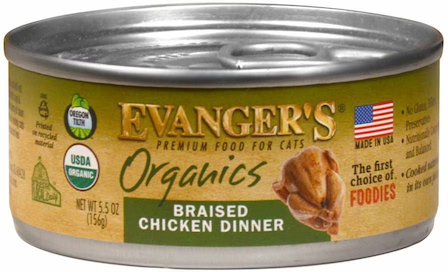
Made by a family-owned business, Evanger’s wet cat food contains wholesome raw ingredients in their natural juices to lock in nutrients. Made with all-natural organic chicken, this option is high in protein. It’s also gluten and grain free and loaded with antioxidants to aid in a healthy immune system.
Pros
- USDA certified organic; certified kosher
- Made from start to finish in the United States
- Added taurine
- Grain and gluten free
- No soy, corn, or wheat
Cons
- Contains liver, which, in large amounts, can affect cats’ bone growth
Best Affordable Organic Cat Food
Our pick: Tender & True Pet Nutrition Organic Chicken & Liver Recipe

With its main ingredient being cage-free organic chicken, this dry cat food is a tasty option for kitties in all life stages. In addition to being high in protein, it also includes antioxidants, vitamins, and minerals to provide optimal nutrition for your feline friend. The best part? It’s very reasonably priced!
Pros
- USDA certified organic
- Great price point
- Free of grain, corn, wheat, and soy
- No added hormones, preservatives, colors, or flavors
- Made with humanely raised and ethically sourced ingredients
Cons
- Some pet parents felt the size of the individual pieces of kibble was too small
Cat Foods with Organic Ingredients
Best Dry Organic Cat Food
Our pick: Petcurean Gather Free Acres Organic Dry Cat Food
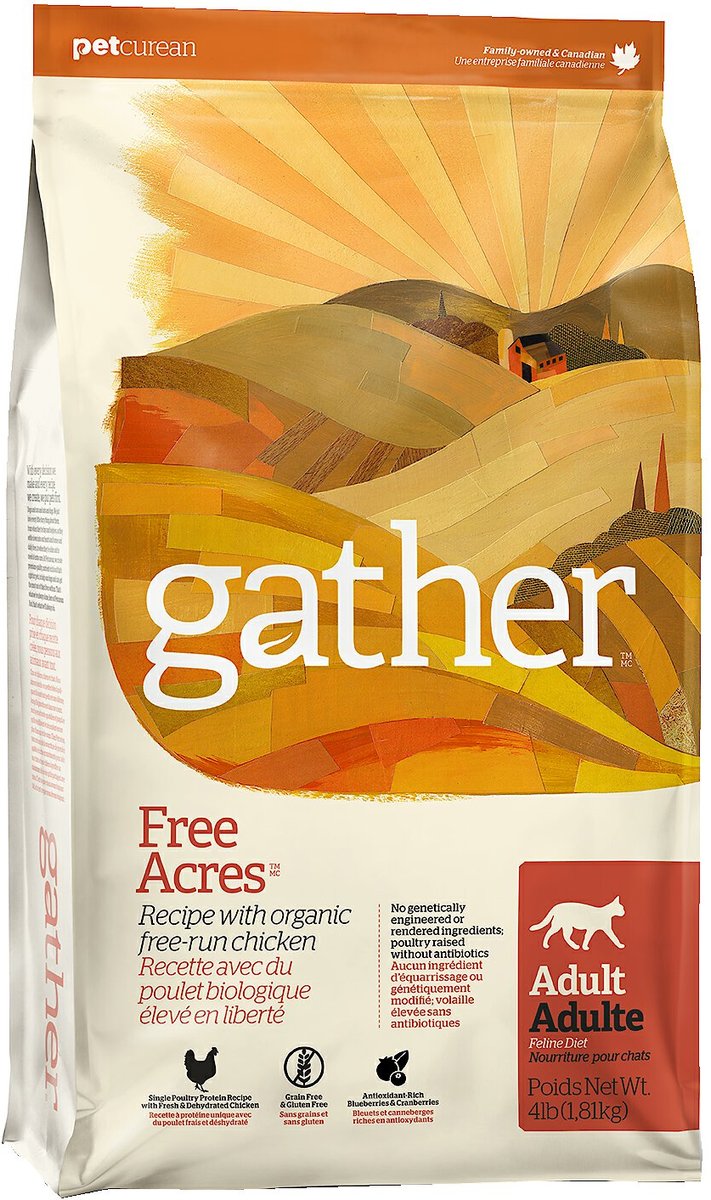
One of the great things about this dry cat food is that it features a single source of poultry protein: sustainably produced, certified organic, free-run chicken. And beyond that, we love that it’s packed with ingredients – like organic flaxseed, blueberries, cranberries, organic peas, and lentils – that provide added health benefits. Plus, it’s formulated without wheat, corn, soy, or artificial additives, making it a fantastic choice for your kitty.
Pros
- Single poultry protein recipe made with sustainably produced, certified organic, free-run chicken
- Contains other organic and beneficial ingredients
- No wheat, corn, soy, or artificial colors, flavors, or preservatives
- Non GMO
Cons
- For adult cats only
- Not 100% organic
Best Freeze-Dried Organic Cat Food
Our pick: Open Farm Harvest Chicken Freeze Dried Raw Cat Food
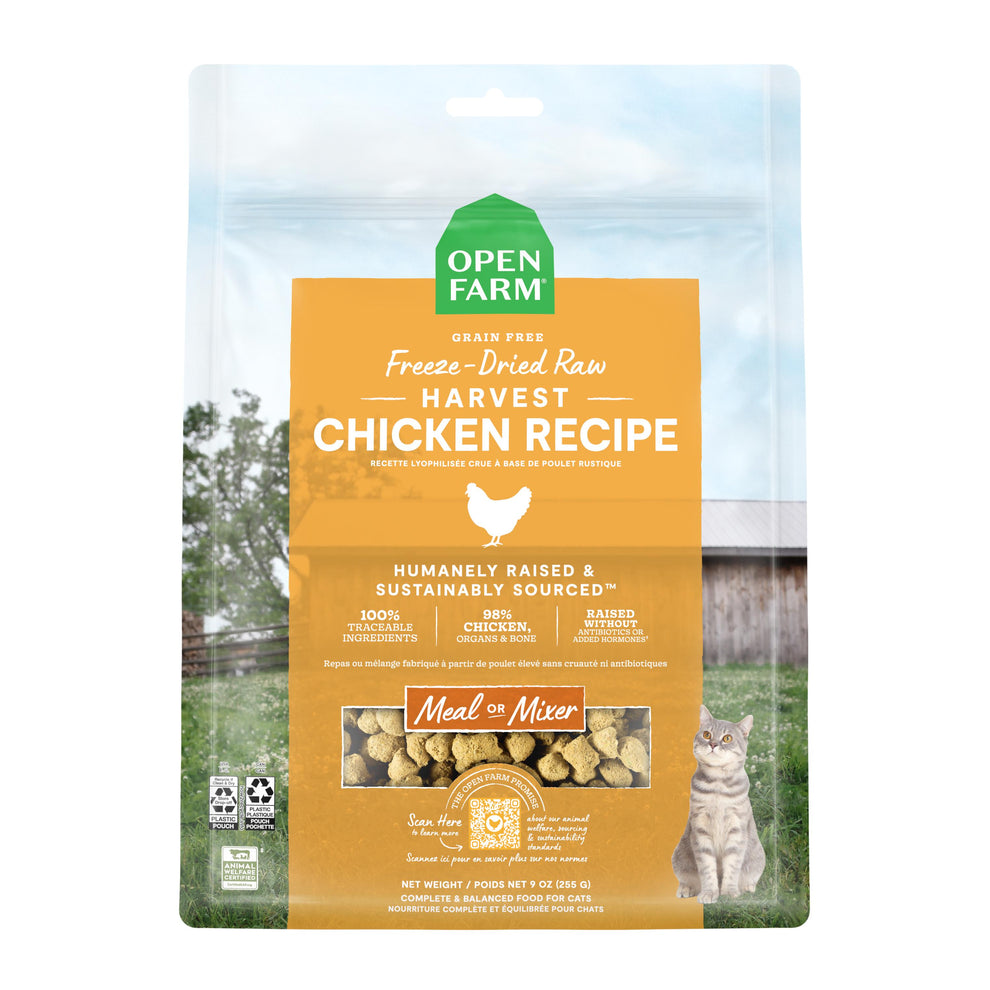
20% off first auto-ship order with code VETSTREET
While not everything in this freeze-dried cat food is organic, Open Farm prides itself on using 100% traceable ingredients, as well as non-GMO fruits and veggies. This grain/legume-free option is an excellent source of protein thanks to the never-cooked freeze-dried chicken. Plus, it’s incredibly versatile. Mix it with kibble, or let it stand on its own as a well-balanced meal for your kitty.
Pros
- Made with 98% humanely raised, free-to-roam, freeze-dried chicken that’s antibiotic, hormone, and steroid free
- Contains organic fruits and vegetables
- Added nutrition from organs and ground bones
- Can be a mixer or a full meal
- Available in other flavors
Cons
- Higher price point
- Not 100% organic
Best Grain-Free Organic Cat Food
Our pick: Stella & Chewy’s Purrfect Cage-Free Chicken Paté
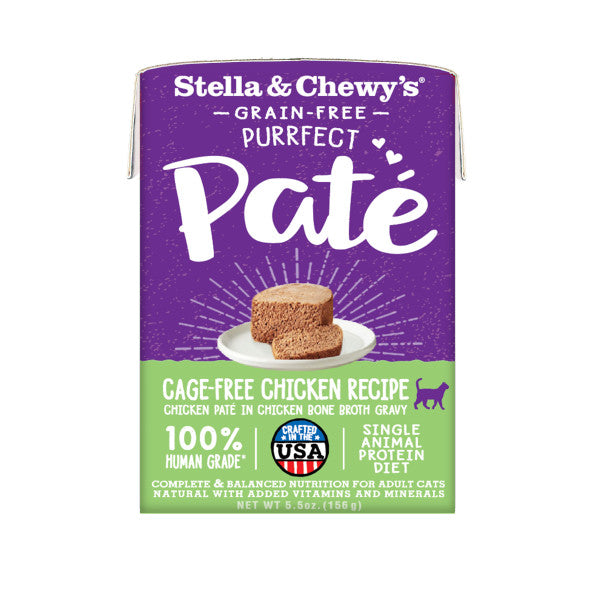
Known for its whole muscle meat, bone broth, and organic fresh-cut vegetables, this grain-free chicken paté from Stella & Chewy’s is a perfectly well-balanced meal time option for your cat. It’s made with 100% human-grade ingredients and contains no artificial preservatives or coloring, hormones or antibiotics, or corn, wheat, or soy. Plus, added taurine packs an extra punch of nutritional value.
Pros
- Made with 100% human-grade ingredients, including cage-free chicken and organic vegetables
- Free from grains, artificial preservatives/coloring, and added hormones/antibiotics
- Contains added taurine
- Available in other flavors like turkey and salmon
Cons
- Higher price point
- Not 100% organic
What Is Organic Cat Food?
If you’re wondering if natural cat food is the same as organic, the short answer is no. While the terms natural and organic can sometimes be used interchangeably to refer to cat food of its variety, they technically don’t mean the same thing.
“Regardless of the standard set by AAFCO (Association of American Feed Control Officials) for natural food, [organic cat food] refers to foods with better quality ingredients that do not have any additives, preservatives, or synthetic ingredients (including synthetic multivitamins),” according to Dr. Chinonyerem Ukweni, pet owner, animal lover, and veterinarian with Pet Parking. “[These foods] are minimally processed and do not have certain ingredients like soy and animal by-products that otherwise meet the AAFCO natural food guidelines.”
And not to confuse you even more, but you also may have also encountered “human-grade cat food,” which is becoming more and more popular. This type of cat food is made with ingredients that meet the human standard of food, meaning that they follow the standards of what we eat. However, Dr. Ukweni points out that this preference is lifestyle based and has nothing to do with the nutritional quality of the cat food. So, basically, just because a cat food is human grade doesn’t necessarily mean it’s organic.
Pros and Cons of Organic Cat Food
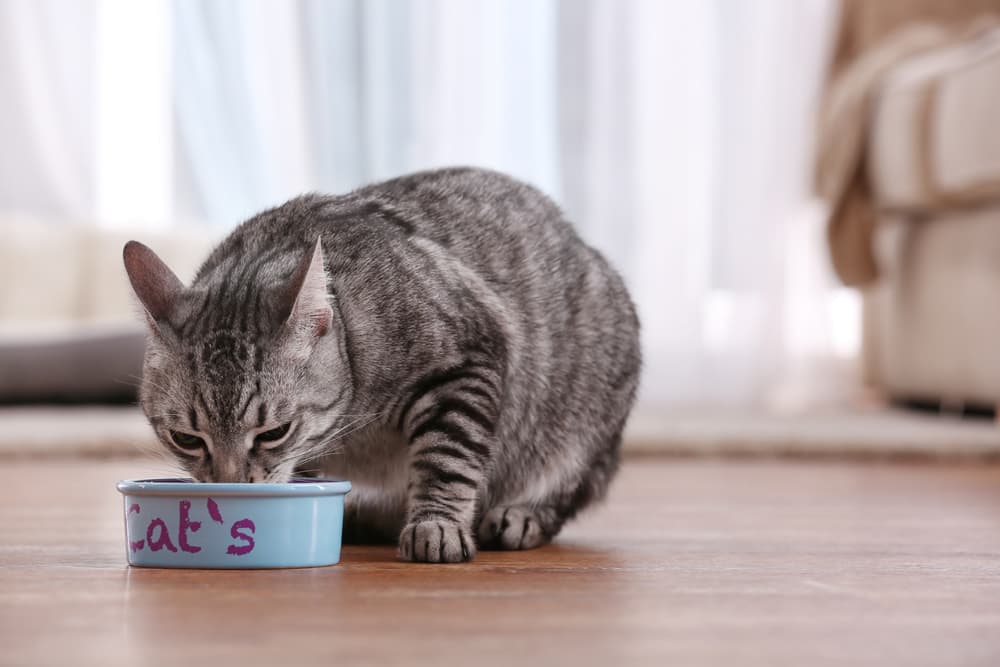
Now that we have the basics down, let’s go over some of the pros and cons of organic food for cats.
Pros
Ingredients. One obvious pro is quality ingredients. When you read cat food labels, it’s comforting to know that all of the ingredients are, in fact, organic. However, if having cat food that is 100% organic is crucial for you, it’s important to look for that USDA certification seal on the packaging. If a cat food is marketed as having organic ingredients but doesn’t have that seal, it means that not all of the ingredients are.
Availability. Another plus is that we’re starting to see different types of cat food more and more. Rather than maybe just one option, you have several to choose from.
General wellness. According to veterinarian Dr. Iram Sharma, organic food for cats can have some health benefits. “This type of food is great if your cat is dealing with obesity as it can help in weight-management. Consuming organic cat food regularly will [help] cats to have regular bowel movements and keep their poop and pee less smelly,” Dr. Sharma says. “The main reason for that is that organic food doesn’t contain artificial flavors or colors that may cause different irritations to the cat’s digestive system. Instead, these organic ingredients are digestible and can improve the cat’s immune system.”
Cons
Cost. While you want what’s best for your cat, especially when it comes to what they eat, sometimes money can be a factor. Most organic food does come at a higher price, however, more affordable options are available.
Shelf life. Another disadvantage to consider is the shelf life. Because of the lack of preservatives, most organic options won’t last as long as their non-organic counterparts.
Our Selection Process
In addition to talking to Dr. Ukweni and Dr. Sharna, we also considered the following when building our list of best organic cat foods.
Organic certifications. While we did highlight several cat foods that are organically certified by the USDA, we also included a few options that are not fully organic but do contain organic ingredients.
Ingredient quality. We took a close look at the ingredients of each selection, calling out the quality and nutritional benefits.
Ratings/reviews. In addition to the USDA, of course, having the seal of approval from other pet parents is incredibly helpful when purchasing food for your cat, so we made sure to take a look at what they had to say in the reviews section.
Price. As mentioned above, these cat foods are naturally going to be on the expensive side, but we tried to keep all budgets in mind and included a less expensive option as well.
Organic Cat Food Buyer’s Guide
Ready to get shopping? Before you start adding organic kitty food to your cart, it’s important to consider the following:
Budget. Organic food for cats is naturally going to be more expensive than non-organic, so it’s important to understand how much you want to spend before getting your cat hooked on something that may be out of your price range.
Your cat’s health condition/age. A cat’s health and age should always be a priority when it comes to feeding. “Avoid feeding senior or diabetic cats natural food that is high in carbohydrates, low in protein and does not meet their nutritional requirement,” Ukweni recommends. “Always consult your veterinarian to advise accordingly.”
Label info. Check to see if the cat food you’re considering is actually 100% organic, or if it simply contains some organic ingredients. “Cat food labeled 100% organic informs buyers that every ingredient used in producing the cat food was minimally processed as human-grade organic food with ingredients derived from plants and animals not exposed to pesticides, hormones, synthetic fertilizers, sewage sludge, [or] irradiation, and are not genetically engineered,” says Ukweni. “The USDA organic seal on the package indicates the quality of the organic products.”
Shelf life. Ukweni advises cat parents to pay close attention to the shelf life. “Most of them lack preservatives and [can] go bad once opened.”
Bottom Line: Put Your Cat’s Needs First
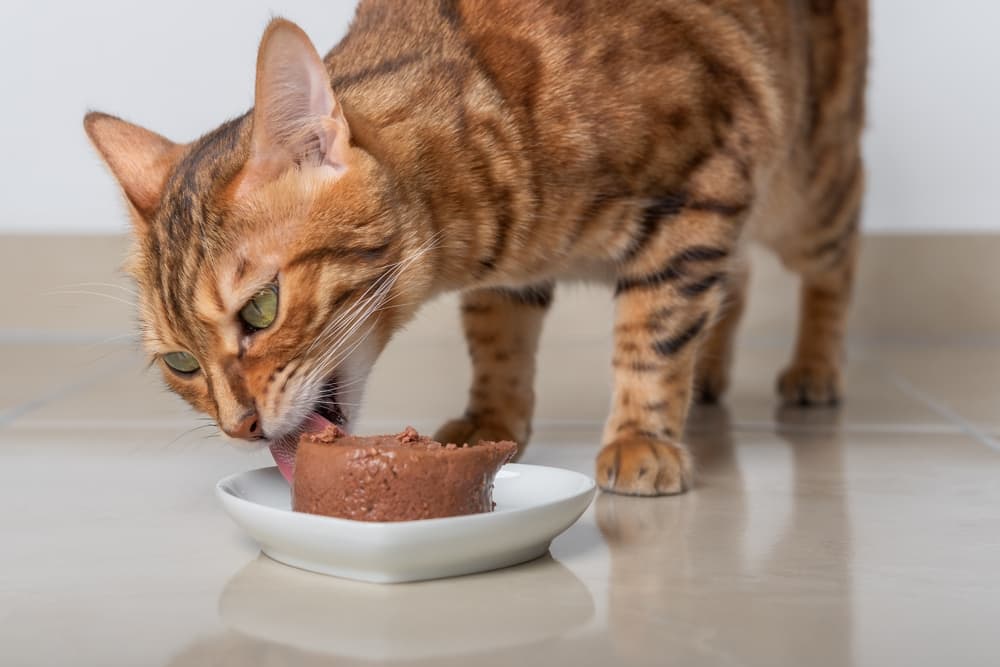
Even after you consider the important factors listed above, don’t forget you’re feeding a cat and not a human. While humans may lean into eating organic foods or choose to be vegetarian or vegan for various reasons, when it comes to cats, what’s “healthiest” is really about their needs as a species.
“Sadly, the emphasis on organic ingredients containing vegetables in place of measurable synthetic multivitamins has resulted in nutritional disorders in cats due to their peculiar nutritional needs as obligate carnivores,” Ukweni explains. “A study on cats raised on plant-based diets as against meat-based diets showed the former cats were prone to gastrointestinal disorders and developed nutritional disorders.”
Whether organic or not, the best thing you can do for your cat is choose a food that they enjoy and is all-around healthy and beneficial for them.
[ad_2]
Source link
